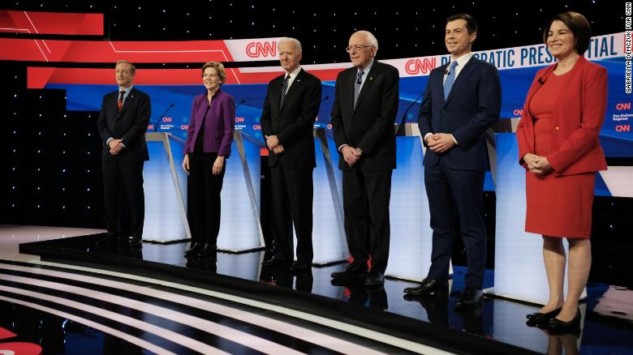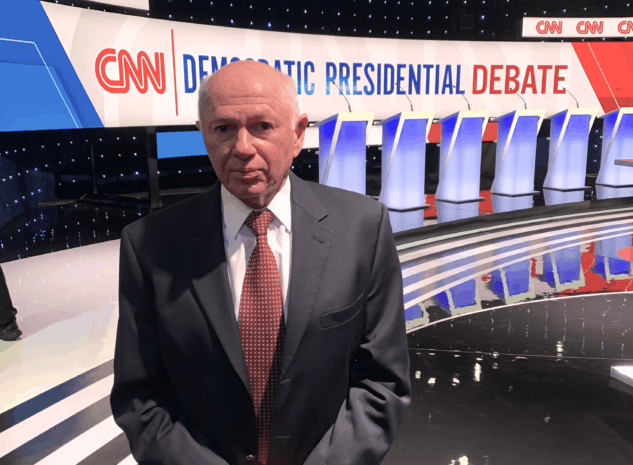
We have just witnessed the seventh Democratic presidential debate of the 2020 election cycle without a single question about Social Security. The candidates tussled over foreign and domestic policy, but no one mentioned the program that 64 million Americans depend on for basic financial security – at a pivotal time when Social Security could be expanded and strengthened, or weakened and cut.
“I thought the moderators would, at long last, ask the candidates about Social Security,” said National Committee president and CEO Max Richtman, who attended last night’s debate at Drake University in Des Moines. “Needless to say, I was very disappointed.”
On Tuesday, the Des Moines Register (which cosponsored the debate with CNN) published an op-ed by Richtman and former Iowa Senator Tom Harkin, insisting that Social Security receive the attention it warrants:
As President Franklin Roosevelt made clear when he signed Social Security into law, the program is a ‘cornerstone in a structure… which is by no means complete.’ He understood that the program would need to be expanded over time. Presidential contenders in the party of Franklin Roosevelt must be asked about Social Security’s future on the debate stage. Seniors deserve to hear their answers. – Fmr. Senator Tom Harkin and National Committee President Max Richtman, Des Moines Register
For the past seven months, the National Committee has repeatedly called upon debate moderators to ask the candidates about their plans for Social Security, but once again those appeals have fallen on deaf ears.
Most of the Democratic presidential candidates have touted their own proposals for boosting and strengthening Social Security on the campaign trail, but debate-watchers may not be aware.
Much is at stake for current and future retirees, the disabled, and their families. Just one day before the debate, the National Institute on Retirement Security released a new report which found that 40% of older Americans rely entirely on Social Security for retirement income. (Only 7% receive income from Social Security, a pension, and a defined contribution account like a 401K.) The average monthly benefit of $1,500 is barely sufficient to keep many seniors out of poverty. That’s why the National Committee endorses legislation that would give seniors a boost in benefits while keeping Social Security financially healthy through the end of the century.
Meanwhile, prominent conservatives – from Trump budget director Mick Mulvaney to Senate GOP leader Mitch McConnell – have called for Americans’ earned benefits to be “reformed” (which really means cut and privatized). These “reformers” blame the swelling national debt on Social Security, even though the program is self-funded. In fact, ‘tax expenditures’ – especially the Trump/GOP tax cuts of 2017 – are the main driver of the federal debt. The Democratic presidential candidates should rebuke this ploy to cut benefits. The debates provide a platform with millions of viewers who need to know.

National Committee president Max Richtman at the Democratic presidential debate in Des Moines
Although the candidates did not address Social Security last night, they did confront another issue that disproportionately impacts older Americans – soaring prescription drug prices.
“Senator Elizabeth Warren doubled down on a pledge to lower drug prices on her first day as president, using executive action to make it easier for generic drug makers to move in on brand-name drugs that were created using federally funded research.” – Stat News, 1/14/20
Candidates Joe Biden, Pete Buttigieg, Amy Klobuchar, and Bernie Sanders joined Warren in pledging to lower drug prices by various means, including price controls and allowing Medicare to negotiate drug costs with pharmaceutical companies. Senator Klobuchar also raised another crucial issue for seniors – the lack of affordable long-term care insurance:
“What should we do about long-term care, the elephant that doesn’t even fit in this room? We need to make it easier for people to get long-term care insurance. We need to make it easier for them to pay for their premiums.” – Sen. Amy Klobuchar, 1/14/20
“I was glad to see some of the candidates address prescription drug prices and long-term care,” said Richtman. “But the upcoming primary debates must include one of our most important social insurance programs, Social Security. We’ve been trying to put this on the radar for so long, and we’re going to keep trying.”


